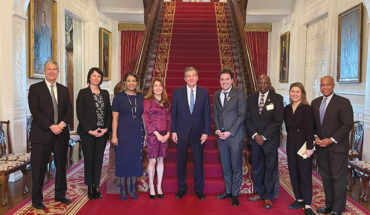photographs by Travis Dove
Old Raleigh met New Raleigh, tech division, on Oct. 29, 2012. On that date The News & Observer ran a story about a successful local technology company, Deja Mi, in the process of hitting it big 21st-century style: Owner Justin Miller and his company had developed a successful app.
Called WedPics, the app allows a small group of smartphone users to share pictures and comments in real time at an event, creating a sort of intimate, hyperlocal, event-focused social network. Though Miller originally conceived of the technology as a way for concertgoers to share their experience, it quickly emerged that weddings were the app’s natural habitat, and it was having great success.
The N&O story described that – and the work environment at Deja Mi, whose 13 employees were housed, in true start-up fashion, in Miller’s basement.
Uh-oh. Enter old Raleigh.
Maybe some anonymous neighbor read the story and called to complain about a business in a residential neighborhood. Maybe some zealous Raleigh zoning inspector saw the pictures in the paper and mobilized. Either way, zoning called Miller the day the story came out to let him know that his basement wasn’t allowed to house 13 employees, and Deja Mi suddenly needed a new home.
That’s the bad news. The good – and perhaps unexpected – news is what happened next. Miller, a tall, beefy guy of 32 with the upswept hair and body art that make him look exactly like your image of an up-all-night coding entrepreneur, describes it as like the moment in a Scooby Doo episode when characters who think they’re alone in the dark suddenly see blinking eyes appear around them. In response to the city’s rebuke came an outpouring of offers of support – from citizens, small businesses, and other tech entrepreneurs.
“I was like, ‘Oh, I didn’t know you guys were out here,’ ” he says. He received a hundred or so offers of one sort or another, including one from a company that offered its own basement – which Miller says made the one Deja Mi had to abandon look like the Taj Mahal.
By the time the smoke cleared – the end of the very next day – Miller had agreed to move into the brand-new HUB Raleigh, in the Junior League of Raleigh’s building on Hillsborough Street at St. Mary’s. The HUB is the kind of entrepreneurial co-working space widely encountered in places like Silicon Valley: shared reception and conference rooms, rentable offices, open workspace available on a per-month basis, a shared eating/break area, and even a little café/bar called the Click Café, with free coffee and beer. In fact, the Hub is part of a network of such spaces in more than 30 cities around the world, loosely connecting emerging entrepreneurs worldwide. So it was a natural fit for Deja Mi’s 13 employees. Miller signed on.
“That was Wednesday,” he recalls – the day after the story ran. “Thursday I came and met everybody” at the HUB’s grand opening party.
That’s fast even for the tech world. Miller wasn’t the only person who didn’t know that Raleigh’s growing downtown even had a tech entrepreneurship community, much less one that could instantly fling a hundred different offers at a company booted out of its basement. But it’s there, and it’s doing what communities of entrepreneurs do: It’s growing.

BROOKS BELL INC
The founder of her self-named firm turned the second floor of the Junior League of Raleigh building into cutting-edge workspace for her group and the HUB.
Consider the case of Brooks Bell, one of the organizers of HUB Raleigh, which shares its floor in that Hillsborough Street building with her self-named online conversion firm. Her firm does what is called A/B testing – basically trying several versions of web pages, with differing text, pictures, and links, to see which most successfully get sales, downloads, or some other desired result. “It’s a great mix of data, psychology, marketing, creativity, and technology,” she says. Her client list includes companies like Brooks Brothers, AOL, and Xfinity, so her business doesn’t lack for cred.
Raleigh, though, has been a different story. She describes in 2011 attending Fortune Brainstorm Tech, an annual tech convention/marketplace in Aspen, Colo., and describing her business. “I was hanging out with these guys from the Bay area, and their reaction was really positive,” she recalls. “Until I said, ‘Raleigh.’ I could see my credibility sinking. That made me so mad.
“So that created the seed,” she said. “To make the Triangle a top-five entrepreneurial region within five years.”
Whoa. Kind of a high bar for a place lacking cred.
But Bell felt that if Raleigh lacked cred, it didn’t lack the elements that create it. For example, she knew the Raleigh start-up ShareFile was about to be acquired by software and cloud computing giant Citrix Systems – she’s married to Jesse Lipson, who started ShareFile in 2003 when she founded her company, after they closed their first start-up, Novel Projects. She obviously couldn’t share that inside information, but she didn’t think that was all Raleigh’s tech community had to share.
She believed Raleigh and the Triangle were awash in exactly the kind of employees tech companies need. She had gone to Duke, and she knew that its tide of graduating students, plus those from other universities and employees from Research Triangle Park, were ideal. She knew tech incubators like Durham’s American Underground, opened in 2010, were having great success, and she knew that companies like hers and like ShareFile were thriving in Raleigh.
But as far as the rest of the world was concerned, Raleigh was a good place to find employees – and then take them away. And as a downtown Raleigh entrepreneur herself, she felt something lacking. “It felt like there were no entrepreneurs,” she says. “There were very few co-working spaces. There was no center of gravity in Raleigh. As a result of no community, there was very little buzz.”
So she set out to make it.
Build buzz
That top-five goal? She’s realistic about that. No place is going to supplant Silicon Valley, Boston, or New York as the top three spots for tech entrepreneurship. But in that second level? Raleigh, she is sure, can hang with the Austins and Boulders of the world. She asked herself what was lacking and came up with two main answers: capital and space. She thought HUB Raleigh would not only help provide the space but also would provide a central spot to help investors and entrepreneurs find each other.
“And since [it opened on] Nov. 1, we’ve already got 33 entrepreneurs working out of this. It shows how Raleigh desperately needed something of this scale.”

BIG PLANS
Jesse Lipson surveys the block-long site on West Street that will house Citrix Systems. He became vice president and general manager of data sharing for Citrix when the software giant bought his company, ShareFile, in 2011.
Jesse Lipson, Bell’s husband, echoes everything Bell says. As metaphor rather than comparison, Lipson likens the Triangle’s main cities to the New York landscape: Raleigh would be our Manhattan; Durham is the Triangle’s Brooklyn, with Chapel Hill like a Princeton, N.J. “Raleigh’s a little bit more of a young professional city.”
He says that from an office on the western edge of Raleigh, though he won’t remain there long. ShareFile, the cloud-based file-sharing service he launched in 2005 and built without a dollar of outside investment, grew successful enough to be purchased by Citrix Systems in 2011, and he’s now its vice president and general manager of data sharing. So when Citrix announced plans to move into a renovated building in the downtown Raleigh warehouse district, Lipson was getting the downtown workspace he and Bell have wanted from the start. “We have a lot of young employees who are really excited about being downtown,” he says. And that group of 400 who will be part of the first Citrix group downtown surely includes the people with good ideas for (shhh!) their own basements – or the HUB, anyhow. “Those people will then become the start-ups of tomorrow.”
And it’s a virtuous circle, he’s convinced. Red Hat is in the process of moving 1,000 tech employees downtown; Citrix will add hundreds more. That supports more restaurants, more stores, more downtown living. “The more culture we have, a cool place to work and play; every time we [bring downtown] another company, it becomes easier for the next.”

STEPLEADER
Under the watchful eye of a gallant gent, Brian Handley of StepLeader, left, speaks with employee Kris Ostrowka in the renovated warehouse on West Hargett St. that serves as StepLeader’s headquarters.
Brian Handly, CEO of StepLeader, says much the same from a conference room in StepLeader’s renovated warehouse on a block of West Hargett Street that Handly says “I had literally never even been on before we moved in here.” When DejaMi’s Justin Miller said he didn’t know about other tech start-ups downtown, it’s because they’re hiding in places like this: cool, but unknown.
A spinoff from Capitol Broadcasting Company based on the success of a WRAL app, StepLeader creates digital and mobile information apps used by publishers, especially television stations, nationwide. When it came time for the company to take its 28 employees and step away from its parent, Handly did nothing more complicated than look at a map. “We mapped out where all of our employees reside: Wake Forest, Clayton, Cary, Garner, Durham … geographically it makes a lot of sense.”
He agrees with Bell that the Triangle will be a major tech destination, and it is happening fast. “Look at Durham, three, four years ago,” he says. “There was nothing.” American Underground comes up: “Hey – it’s a basement,” he says. “But now every tech start-up wants to look at American Underground.” So developments like HUB Raleigh are exactly what’s needed: “It takes a culture shift here – that downtown Raleigh is a hip, happening place for entrepreneurs.
“Then you look at (the success of a company like) ShareFile. We need more of that.”
Creative creature comforts
Beyond the map, Handly made a list when moving StepLeader out of WRAL: “We wanted places within walking distance. Where we can go eat, have coffee. “ Research Triangle Park was not the answer for the younger, more energetic people who work at companies like his – people whom urban studies theorist Richard Florida calls the Creative Class. “You have to get in your car to do anything. Here I can walk out the door to three restaurants within a few steps. And from what I hear, a brewery is opening up right behind us.
“It’s much more attractive to folks with that entrepreneurial mindset.”
On the other hand, like many entrepreneurs, he pointed out the difficulty of finding venture capital in Raleigh. The American Underground has offices in Durham’s American Tobacco Campus, with tech accelerator Groundworks and several venture capital firms and the Council for Entrepreneurial Development. Thus a new business can find funding, incubation, and advice without leaving its campus.
Bell sees the HUB as a place for that, too. Miller, in fact, got more than his space at the HUB from his forced exit from his basement. “The silver lining was twofold,” he says. “We got a local investor on board. A local tech angel,” whom he prefers not to name.
Money comes from other places, too, Miller says – at a Washington, D.C., start-up pitch competition called Distilled Intelligence he was overwhelmed by the tax breaks, cash, and other incentives D.C. offered, and he fears those may lure companies away. “I would love to see Raleigh start offering incentives.”

CHARTING NEW PATHS
CEO Zach Clayton and President Emma Battle run Three Ships Media from the second floor of a renovated furniture factory on the corner of Hargett and Wilmington streets.
Zach Clayton, founder and CEO of Three Ships Media, doesn’t agree. Three Ships, a social marketing and tech company that works beneath tin ceilings in bright, renovated offices at the corner of Hargett and Wilmington streets, is named for the exploring spirit of the three ships of Columbus. Just as independent, Clayton doesn’t want incentives or tax breaks: “The city created the environment for good work,” he says, referring to the investment the city has made in downtown over the last decade. “I’m a Republican who’d say (Democrat) Charles Meeker has done more for the city than any civic leader in 100 years. We have well-lit streets, a strong education system, public transit. That’s all we could ask for. We have two [of 25] people who come from Chapel Hill on the TTA bus. How cool is that?”
He gets advice, staff, talent, and customers all without leaving downtown. The only change he’d like to see involves risk. He’d like to see more venture capital willing to take risks on start-ups. In fact, he thinks Raleigh needs to develop a looser attitude towards risk in general.
“We have great momentum as an area. The gaps aren’t talent or ideas. But if this area wants to become Silicon Valley, it’s going to have to become more comfortable with failure.” Like any new business, tech start-ups fail regularly. But with tech-savvy venture capital around, founders of failed businesses have no trouble getting funding for the second or third attempts that eventually succeed. With stolid, Old South venture capital? Not so much.
He considers Bell and Lipson to be mentors and doesn’t doubt their goal of making the area a major tech region. “You have SAS in Cary; you have Red Hat. You have Citrix. We have first-tier talent. If Brooks and Jess lead the charge, that will accelerate progress towards that goal.”
Longtime downtowner Bill Spruill says Raleigh is further along than it even knows. “We are a vibrant spot compared to a lot of other areas, and we’ve done it on a sort of organic basis. I feel like we already are one of the top places, we just don’t toot our horn enough.” He should know – he started and sold international verification service AddressDoctor, and in 2010 he founded Global Data Consortium, whose offices at Hargett and Salisbury now hold three employees; he’s also on the board of the Council for Entrepreneurial Development. And regarding incentives? “Incentives is a big, big bucket,” he says. “What I think we need as incentives are more infrastructure around transit – connectivity for entrepreneurs. Anything that removes barriers to people getting together and moving on their business ideas are good incentives for the area.” He lives downtown too and says a downtown grocery, healthy food options, and more bike paths would be more successful than tax breaks in luring and retaining the type of people who start and populate tech companies.
Above all, he agrees with Clayton about comfort with uncertainty. Like Clayton, he rents from Empire Properties, which offers what he calls a “soft and subtle incentive” in a lease that’s “sensible in the pricing and arrangements with entrepreneurs.
“If your business is successful, you’ll grow and they’ll grow with you. If your business isn’t successful – and a lot of entrepreneurial businesses are not – you’re not held into some weird, five-year thing.”
Low cost of living. Interesting spaces to rent. Places to walk, eat, drink, and play. New co-working space, a growing and supportive community, and an influx of large tech companies. It’s hard to see anything that will derail the growth of Raleigh’s downtown tech presence.
As long as nobody calls zoning.






